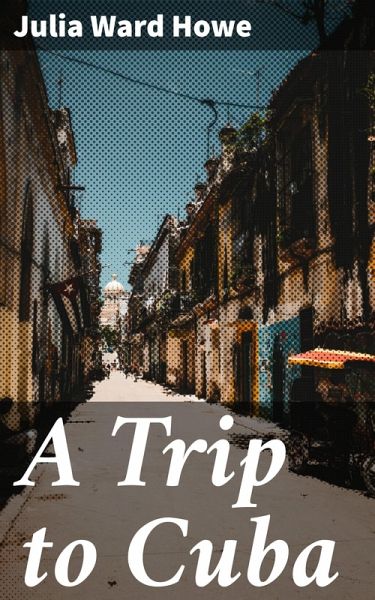
A Trip to Cuba (eBook, ePUB)
Enriched edition. An Immersive Literary Journey Through Colonial Cuba
Kommentar: Dixon, Fiona / Redaktion: Good Press

PAYBACK Punkte
0 °P sammeln!
In "A Trip to Cuba," Julia Ward Howe presents a vivid account of her travels through the Caribbean island, blending personal narrative with keen social observation. Written in the mid-19th century, the book captures the complexities of Cuban society, examining the intersections of culture, colonialism, and slavery during a tumultuous era. Howe's striking prose and evocative descriptions not only illuminate the geographical landscapes but also reflect her growing consciousness about the moral implications of international affairs, particularly regarding emancipation and human rights. The work s...
In "A Trip to Cuba," Julia Ward Howe presents a vivid account of her travels through the Caribbean island, blending personal narrative with keen social observation. Written in the mid-19th century, the book captures the complexities of Cuban society, examining the intersections of culture, colonialism, and slavery during a tumultuous era. Howe's striking prose and evocative descriptions not only illuminate the geographical landscapes but also reflect her growing consciousness about the moral implications of international affairs, particularly regarding emancipation and human rights. The work stands as a significant contribution to travel literature, characterized by a blend of romanticism and realism, revealing both the allure and the contradictions of imperialism. Julia Ward Howe, an accomplished writer and activist, is best known for penning "The Battle Hymn of the Republic." Her travels were motivated by both personal curiosity and a desire to engage with social issues, including women's rights and abolitionism. Howe's experiences in Cuba prompted her to reflect critically on her own society and the role of women within it, making her insights all the more poignant and impactful. Readers of "A Trip to Cuba" will find not only an engaging travelogue but also a thought-provoking exploration of ethical considerations in the context of 19th-century imperialism. This work invites contemporary readers to reflect on the legacy of colonial attitudes and the interconnectedness of global struggles for justice. In this enriched edition, we have carefully created added value for your reading experience: - A succinct Introduction situates the work's timeless appeal and themes. - The Synopsis outlines the central plot, highlighting key developments without spoiling critical twists. - A detailed Historical Context immerses you in the era's events and influences that shaped the writing. - A thorough Analysis dissects symbols, motifs, and character arcs to unearth underlying meanings. - Reflection questions prompt you to engage personally with the work's messages, connecting them to modern life. - Hand-picked Memorable Quotes shine a spotlight on moments of literary brilliance. - Interactive footnotes clarify unusual references, historical allusions, and archaic phrases for an effortless, more informed read.
Dieser Download kann aus rechtlichen Gründen nur mit Rechnungsadresse in A, B, BG, CY, CZ, D, DK, EW, E, FIN, F, GR, H, IRL, I, LT, L, LR, M, NL, PL, P, R, S, SLO, SK ausgeliefert werden.













